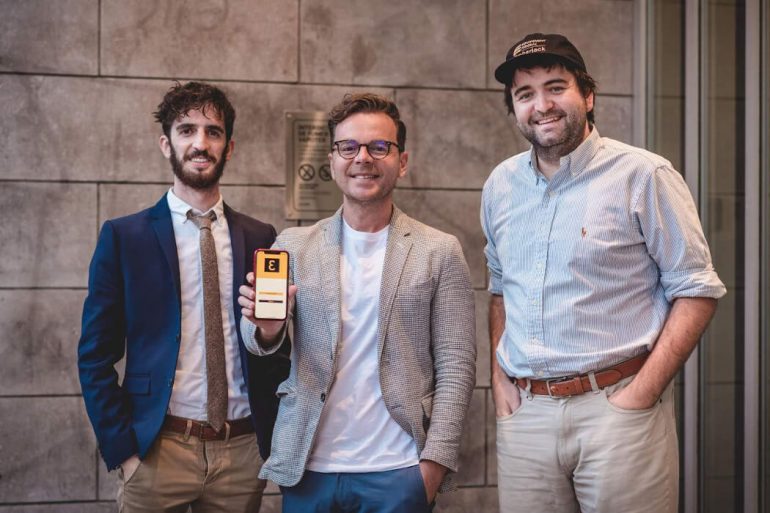After establishing a presence in Québec, Eva has its sights set on taking its blockchain-powered ride-sharing and delivery platform to Ontario and Alberta.
The Montréal-based software startup offers what it claims is “the first ride-share and delivery platform built on blockchain.”
In the past year, Eva claims it has facilitated over 165,000 deliveries from more 1,500 restaurants and retailers.
Founded in 2019 as a ride-hailing service, Eva saw steady growth until March 2020, when, like ride-sharing companies such as Uber, its core business was hit hard by COVID-19. Amid this environment, Eva followed in Uber’s footsteps and turned its attention to delivery, rolling out a delivery product in October 2020. Since then, Eva says it has seen 700 percent growth in Québec, fuelled by a rise in demand for delivery services during the pandemic.
In September, Eva scored $1.2 million CAD in seed financing to build on its growth in markets like Montréal and Québec City and bring its ride-sharing and delivery software to Toronto and Calgary.
The startup’s all-equity round was led by Eva Investment, an American group of retail industry and tech experts, named as such because Eva was their first investment. Eva’s seed financing was also supported by the National Research Council of Canada’s Industrial Research Assistance Program (IRAP) and existing investor Progitech.
Eva was co-founded by COO Dardan Isufi and CEO Raphaël Gaudreault, a software engineer who formerly worked at early Eva investor Progitech. The startup offers blockchain-powered B2C ride-hailing and B2B delivery services.
“We noticed many problems and issues with Uber, and what we really wanted to do was to localize management and globalize the service,” Isufi told BetaKit.
Eva connects riders and drivers as platform “members,” offering each the chance to take an ownership stake in its local franchises using blockchain technology. By doing so, Eva aims to attract high-quality drivers and incentivize good behaviour on its platform.
RELATED: Ritual alumni launch GoodGood with $6.5 million to scale commerce for local food and drink makers
The startup is not charging any franchising or licensing fees to start. Eva, and its Québec franchise, which operates as a co-operative, take a cut on a per ride and delivery basis.
“We came up with this idea of social franchising,” said Isufi. “We developed a tool, which is turnkey, and then we license this tool, this software, to local companies.”
Through its white-label delivery product, Eva offers retailers and restaurants the ability to offer delivery services by integrating with online ordering platforms like Shopify and Lightspeed and connecting them with its network of drivers, providing lower-cost deliveries past a certain threshold.
According to Isufi, the average delivery fee on Eva is $8 to $9, which is higher than the cost of platforms like Uber Eats for low-cost orders, but lower for higher-priced orders. To offer cost savings, Eva targets its delivery platform towards retailers like local restaurants with order sizes of $60 to $70 and above.
RELATED: Callia secures $6.4 million to move beyond flower delivery, fuel North American expansion
Eva also allows retailers to “own their own data” by integrating with their existing ordering platforms, unlike Uber and many other large delivery apps, which require customers to order directly through their platforms.
The startup first launched its ride-sharing app in Montréal in May 2019, and Eva claims it grew into “the second most-used” ride-sharing app in the province next to Uber, amassing “tens of thousands of members.”
Historically, the Government of Québec has taken a particularly restrictive regulatory approach to ride-hailing services, which has led to a tumultuous relationship with Uber and has kept other major players like Lyft from operating in the province. Amid this environment, Eva thrived.
“The wind was behind us in a certain way,” Gaudreault told BetaKit. “And then, of all the risks, the potential threats … a global pandemic was not one of the ones that we thought of.”
When the pandemic hit and people scaled back their use of ride-sharing services amid the risk of COVID-19, Eva’s sales dropped 90 percent. “It was pretty depressing,” said Gaudreault. “We went from like having 50 drivers online in Montréal, anytime, to a couple of them because everybody was scared.”
RELATED: Uber plans to double size of Toronto tech team in coming months
When Eva added restaurant delivery to its platform, it found success, and decided to launch a B2B product for retailers.
Since doing this, the startup says it has facilitated over 165,000 deliveries from more 1,500 restaurants and retailers in 12 months, made possible by a 3,000-plus member driver network. Eva has already used some of its seed funding to grow its team as it looks to invest in product development and support its expansion into new markets, where it hopes to open new franchises.
According to Gaudreault, the startup sees its ride-sharing and delivery offerings as complementary, adding that right now, Eva’s main focus is on building driver networks that are as high-volume and efficient as possible. “The inherent value from this service is how big the network is because it shortens the waiting time for consumers,” he said.
Gaudreault said Eva sees potential in bringing last-mile delivery for “any e-commerce [provider],” from restaurants, to the service sector, and retail businesses ranging from pharmacies to cannabis dispensaries.
Feature image courtesy of Eva


